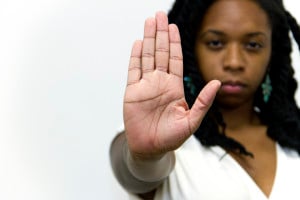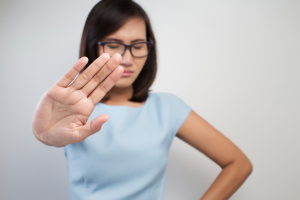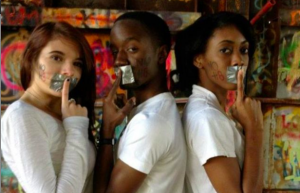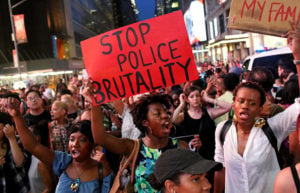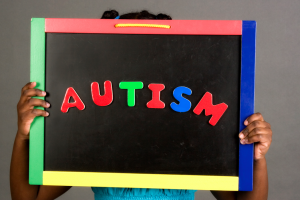It is truly a bizarre experience to be a Black nerd in the US.
Black culture is supposed to be the epitome of “cool” – the music, the fashion, and the swagger all set popular trends. And yet, I’m just over here hoping my friends don’t ask for the latest Fetty Wap lyrics because I’m likely to hit ’em with a James Baldwin quote and hope they don’t notice.
Meanwhile, society cuts and commercializes pieces of Black culture for white consumption.
It’s one of the most pervasive forms of cultural appropriation, when other people take elements of traditionally Black culture without knowledge of or respect for what it means to Black folks.
I’m focusing especially on when white folks appropriate – not because I think you all are the only ones capable of causing harm, but because the United States is dominated by a system of white supremacy that gives white people institutional power over Black people.
Which means it’s crucial to think about context if you’re a white person who wants to borrow something from Black culture.
If you mean to appreciate part of Black culture, that has to include learning about the history of what you’re appreciating, and about the struggles and achievements of the people you’re borrowing from. Then you’ll be the kind of ally who’s informed enough to honor our culture in a way that supports us – instead of just taking what you like and hurting our community.
A lot of white folks who appropriate Black culture don’t mean to be racist – and I wish your intention was enough to guarantee that you wouldn’t hurt people of color.
But we’ve got all this context to consider. It’s the context that makes a difference in whether you’re causing harm or not.
In this case, context includes an oppressive system, white supremacy, which operates invisibly so we all contribute to it without being aware of the harm we’re causing.
Just think of how common it is for white people in the US to make music, talk, and dress in ways influenced by Black culture.
Many of you probably haven’t stopped to think about how your actions affect Black people because the status quo encourages you to explore what you find interesting, to take the clothes and music you’re drawn to and make it part of your life – without thinking about the consequences your choices and actions might have on the marginalized groups who created that thing you’ve claimed for yourself.
So it makes sense if you’ve appropriated Black culture without realizing that you’re contributing to white supremacy. But once you learn about what cultural appropriation does to us Black people, it’s time to do something about it.
That’s why I want to explain how appropriation feels to me, and give you some tools for appreciating my culture without putting me down.
The short version is that having white people call parts of my culture cool doesn’t make me feel cool. But being “cool” doesn’t even scratch the surface – as a Black woman, I’m under pressure to change who I am so that I come across as professional, as loveable, hell, even as something more than disposable.
So with that context in mind, here’s how I feel when white people appropriate my culture.
1. I Feel Mocked
Last year, an old college acquaintance added me on Facebook. Like you do with a social media reconnect, I scanned her photos for updates, and most of them reflected her life as an upper middle class white woman living in a wealthy suburb.
But I stopped scrolling at one picture.
She stood in front of a graffitied wall, bulging her eyes out, scrunching her mouth, and holding two fingers sideways. A red handkerchief pushed her blond hair back from her forehead.
The caption read: “When I went GHETTO!” She and her white friends filled the comments with jokes about her gangsta status.
She didn’t name Black culture, but when you’re living with the context I’m living with, you can’t help but take it personally when someone imitates an image that popular culture associates with Blackness.
What they see as a harmless joke – laughing at the idea of being “ghetto” – makes light of real people’s difficult living conditions. They took a distorted snapshot of what it means to be poor and Black and made a mockery of it.
The graffiti in the background reminded me of the inspiring young artists creating art on walls to transform their neighborhoods into canvases, build their sense of identity, and disrupt the dominant society’s oppressive social codes.
Graffiti is a vital form of self-expression for some Black youth – but they’re routinely criminalized for it, which is no joke for them.
The look on the woman’s face made me think about Black folks mean-mugging the camera to show confidence and strength.
And her handkerchief reminded me that a Black person who dressed and posed like she did would be judged as nothing more than a dangerous gang member.
I thought about how the media shows the people she was imitating – as thugs, as one-dimensional characters, as threats to your family – but not as fully human.
She thought it was okay to mock poor Black people’s struggles because she’s convinced they’re not worth caring about.
That terrifies me.
2. I Feel Othered
Have you heard about Thug Kitchen? It’s a hugely successful blog, now turned into a book, which features healthy, vegan recipes written in African-American Vernacular English (AAVE) – with phrases like “eat like you give a fuck.”
At first, it seemed like a hilarious way to make healthy food accessible to Black city-dwellers who can’t usually get the nutrients they need.
But do you know who’s behind Thug Kitchen? Last year, the creators revealed their identities: They’re a white man and woman.
Suddenly, it feels like the joke’s on us. Their white fans were laughing not with Black folks, but at us – at the absurdity of speaking like a stereotypical thug about food they considered “normal.”
This is an example of how whiteness is considered the norm – if these people had shared the same recipes in their own way of speaking, it would’ve been an ordinary recipe blog.
But they added something “special” – a dialect they borrowed from another culture, which helped them gain attention and profit.
If the creator had been a young Black man who really spoke like the Thug Kitchen persona, he would have had to code-switch in business deals to avoid being stereotyped by people like book publishers and Gwenyth Paltrow’s staff.
He probably would’ve had to keep his hair cut short, and avoid any traditionally Black styles like cornrows or dreadlocks. And still, even if he bought the best suit he could afford, he might have run into people who judged him as lazy or incompetent just because of the color of his skin.
When it benefits them, the creators of Thug Kitchen can adopt an exaggerated version of AAVE – which was developed to help Black people resist and survive oppression.
But when they need to, they can drop the act and access opportunities they only get thanks to white privilege.
In other words, they exploit my culture for profit, but don’t have to face the oppression that comes with actually being Black.
And they get to maintain their culture as the norm, while treating elements of Black culture as trivial things to play with.
3. My Struggle to Be Affirmed Feels Trivialized
Being a Black woman in this country comes with a daily struggle to affirm who I am.
For example, I’ve been under pressure to straighten my hair since the day I was born. Many jobs ban natural Black hairstyles, and natural hair is nearly invisible in the media, sending the message that my hair’s texture is unappealing.
So these days, when I wear my hair in its natural state, it’s not just my personal preference – it’s also a risk I’m taking to fight for appreciation as I am, without conforming to a Eurocentric standard of beauty.
For the past year, I’ve been wearing Senegalese and Marley twists on and off. They’re examples of what Black women call protective styles – styles that help maintain my natural hair.
“Protective” is a fitting description, because my twists also protect my natural look while I take care of my afro – I still get to look like myself.
And I really like how I look – the first time I put Senegalese twists in, I couldn’t stop looking at myself in the mirror.
I should be embarrassed to admit that. But if you had any idea how rarely I’ve thought positive thoughts about my reflection, you’d know that admiring myself is a revolutionary thing.
But now the mainstream media has found Senegalese twists, and their image doesn’t look like my reflection. Teen Vogue featured them as a new trend with a spread showing only white and fair-skinned models.
This is such a common pattern of cultural appropriation: Black folks struggle for affirmation, then develop tools to resist anti-Blackness, only to have white folks claim those tools as their own and erase the significance.
Many readers of Teen Vogue have been introduced to Senegalese twists as a style for white women, without learning about what they mean for women like me after a lifetime of learning to love my hair.
I’ve heard the objections to my sensitivity about this: “It’s just hair.”
When you say that, you shrug off my struggles as if they don’t matter at all.
4. It Undermines the True Meaning of My Culture’s Components
Love of hip-hop isn’t limited to Black folks. People of all backgrounds have come to love the music and style this genre introduced to the world.
But not everyone who enjoys hip-hop connects with its meaning – or even knows how it originated. Do you know how hip-hop started?
It began as an outlet for urban Black youth to express themselves and release stress from the poverty and violence of inner city life.
Since the beginning, Black hip-hop artists and fans have been regarded by mainstream culture as thugs, not real artists or consumers worth paying attention to.
But hip-hop has survived.
Black artists create studios and put the power of resistance in their rhymes. They continue embracing hip-hop culture – even when it costs them mainstream success – and bravely defy the common idea that the way they dress and speak makes them less valuable.
In many ways, the story of hip-hop reflects the struggle and resilience of Black American life itself. It shows that even those who suffer the most at the intersections of economic and racial injustice can create amazing things that help them survive.
And that story – not just a sick beat – is what resonates with so many Black folks about hip-hop.
Mainstream record labels and audiences have stopped ignoring hip-hop. These days, they exchange billions of dollars for the music of white artists like Iggy Azalea and Macklemore, who dominate hip-hop categories at music awards shows.
There’s nothing wrong with being a white person who appreciates hip-hop. But without appreciating what hip-hop really means, you’re just appropriating.
Here’s the situation: Black entertainers are still struggling to find success.
While they struggle, studios package hip-hop for mainstream white comfort by removing everything that’s meaningful about it for Black communities. And removing everything that represents actual Blackness, not just a costume of it.
It’s so discouraging for Black culture to be popular only when Black folks are removed from the equation.
5. Society Values a White Person More for Doing the Same Things I Do
As these examples show, a white person who listens to hip-hop, uses AAVE, or wears traditionally Black hairstyles still benefits from white privilege, while I’d be treated poorly if I did the same.
Pop culture provides endless examples of this double standard. For instance, celebrities with dark skin are rarely seen as attractive like white and fair-skinned celebrities.
That’s why dark-skinned women everywhere celebrate the success and visibility of Viola Davis – a gorgeous, dark-skinned actress with natural hair.
Unfortunately, it’s no surprise that the celebration was soured when a New York Times critic called Davis “less than classically beautiful.”
It’s no surprise that an announcement for the Ghostbusters reboot cast showed three white women in full makeup and awards show gowns, with the only Black actress, Leslie Jones, in a much less flattering pose.
And it’s no surprise that when teenagers jumped on a trend to plump their lips with glass jars and bottles (with some resulting in injury), they weren’t idolizing a Black woman like Leslie Jones, who has naturally full lips.
They were trying to look like white model Kylie Jenner, who achieved her look with cosmetic surgery.
White people can adopt elements of Black looks and still be treated with dignity – be treated as hot trend-setters, even.
This double standard shows that a hierarchy of skin color is alive and well in our society. People will always assign me less value because of the color of my skin.
6. It Ignores the Racism My Community Is Dealing With
Have I mentioned that cultural appropriation makes me feel like I’m living in a bizarro world?
Black folks are treated like we’re disposable all the time. We’re ignored and stereotyped in the media, thrown in jail and killed by police at terrifying rates, and many white people refuse to even say “Black Lives Matter” or acknowledge that racism is a problem.
And at the same time, white people want to be able to do what we do if they deem it “cool.”
For instance, Tom Hanks’ son Chet recently defended his right to say the n-word, saying “no one can tell me what I can’t say.”
Many white people argue that because some Black people use the word with each other, white folks should be free to do the same.
Maybe you wouldn’t think to use the n-word, but you also believe that you, as a white person, shouldn’t be forbidden from doing anything because of the color of your skin. If we’re living in a “post-racial” world that strives for equality, then how is it fair that I can use that word and you can’t?
The key to that question is the fact that we’re still striving for equality – we’re not there yet.
The n-word’s horrific history still haunts us, and it’s still used today by people like white supremacists responsible for more than half of the US’s domestic terror murders.
The n-word is still terrifying to Black folks when it’s used by white people.
When white people emulate the way some Black people have reclaimed this word to stand up to its terror, they dismiss the reality of our country’s violent racism.
Your actions matter – you can contribute to racism by pretending all things are equal and acting on your privilege, or you can recognize your own contributions and put a stop to them.
What to Do Instead
If you still feel like my culture’s the epitome of cool and you’d like to appreciate it, I won’t turn down the compliment. And yes, it’s possible to appreciate Black culture without causing harm through appropriation.
But if you’re just going to take what you like without taking the time to understand it, then you’re appropriating, not appreciating.
Here are three steps to showing respectful appreciation:
Step 1: Learn What It Means to Be an Ally to the Black Community
Before asking “Can I borrow this?” try asking “How can I support you?” Because you can’t show appreciation without the action to back it up.
Don’t just try to gain personal benefit from Black styles without fighting the injustice that strikes Black people’s lives.
Being a supportive ally means listening to us and learning about our struggles. Which also means you’ll learn about the double standards, stereotypes, and discrimination working against the Black community.
And you’ll have a much easier time figuring out which elements of Black culture are just off-limits, and how to adopt other things without causing harm.
Being an ally is an ongoing process, so stay open to learning.
Step 2: Listen to People of Color Sharing Their Experiences with Racism and the Impact of Cultural Appropriation
You’ll be a pro at listening once you get some practice taking action as an ally. But I can’t stress enough how important it is to make a habit of this.
Because getting defensive about cultural appropriation or saying Black folks are just being oversensitive sends a clear message about how much you value Black lives.
You’re saying your “freedom” to do what you want trumps our experiences with racist attempts to erase our culture and dehumanize us.
Sometimes it’s going to be hard for you to understand. There are many times when white people don’t see the harm in what they’re doing, simply because they’ve never been a Black person in the US so they don’t have to live with the impact.
Trust that Black people can speak for ourselves about the impact of racism – and being an ally means centering our voices, not speaking over us about what you think is offensive or not.
Step 3: Apply Context to What You’re Doing
Figuring out the difference between appropriation and appreciation can get super confusing, because there are very few rules that apply to every situation.
So I understand if you have questions, like: What if I grew up around Black people? What if Black people compliment me on this? What if I’m not white, but biracial?
Asking questions is a great way to figure it out – because the key is applying context.
Do some research.
Find out about the origins of what you’re borrowing, and if it’s possible to honor its meaning as a white person. If you’re a biracial person with white passing privilege, reflect on what it would mean for you to be read as a white person benefiting from this aspect of Black culture.
Perhaps most importantly, think about the impact of what you’re doing.
If you’re doing this out of appreciation for Black culture, then are you giving us support or trivializing our struggles?
If you’re doing this for your own self-expression, are you expressing yourself in a way that contributes to the oppression of Black people?
Keep in mind that it’s not just about you – nothing you do is separate from the broader system of white supremacy, no matter how pure your intentions.
***
My Blackness isn’t only skin deep, and it’s not just hair or clothes or music that make me me. It’s not as if Black folks all have one monolithic style we can claim to own.
But the various ingredients of my unique Black identity are more important to me than words can even say.
I’m flattered if you think these things are cool, and I appreciate you for hearing me out about how it feels when they’re appropriated. I hope I’ve given you some ideas on appreciating my culture without adding to my struggle.
[do_widget id=’text-101′]
Maisha Z. Johnson is the Digital Content Associate and Staff Writer of Everyday Feminism. You can find her writing at the intersections and shamelessly indulging in her obsession with pop culture around the web. Maisha’s past work includes Community United Against Violence (CUAV), the nation’s oldest LGBTQ anti-violence organization, and Fired Up!, a program of California Coalition for Women Prisoners. Through her own project, Inkblot Arts, Maisha taps into the creative arts and digital media to amplify the voices of those often silenced. Like her on Facebook or follow her on Twitter @mzjwords.
Search our 3000+ articles!
Read our articles about:
Our online racial justice training
Used by hundreds of universities, non-profits, and businesses.
Click to learn more


